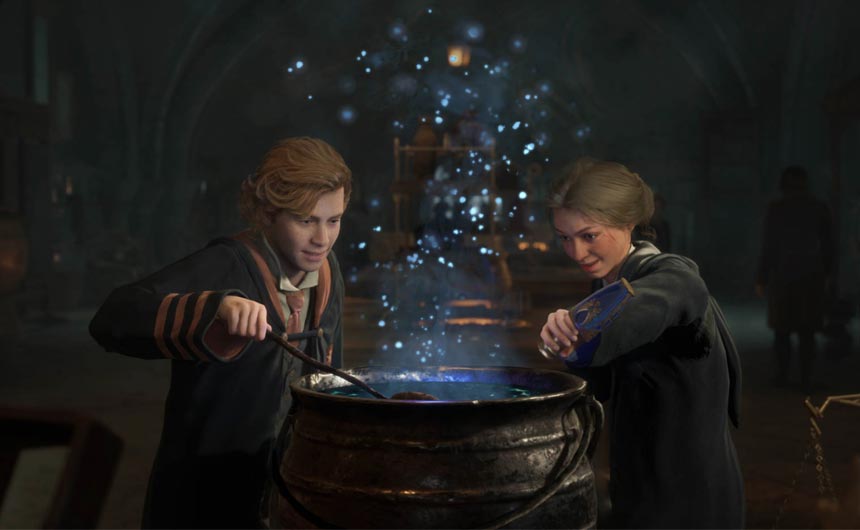Rachit Moti, ceo and founder of Layer – an online marketplace that streamlines the licensing process of getting IP into video games – explains how Hogwarts Legacy and its success could mark a turning point for the popularity of licensed games.
There was a time when the video game market was flooded with video games based on popular film and TV IP. Many of the biggest blockbuster films from the ‘80s, ‘90s and ‘00s have been transformed into video games, but the increased costs and longer development times for modern video games coupled with the increased competition from live-service games such as Call of Duty and Fortnite means there are far fewer games based on IP than there used to be.
IP holders have had to become more selective with what they licence, and those that have their own gaming divisions need to carefully consider the IP they’re building games around. Some gaming divisions have closed entirely. In 2016, Disney announced the closure of Disney Interactive, which had been operating since 1988, and has been selectively licensing its IP to carefully chosen gaming partners ever since.
Of course, there are still plenty of licensed games out there – including those based on Star Wars, Marvel and anime IP – but they don’t dominate the sales charts like they used to. That was until the recent release of Hogwarts Legacy, however, the success of which could mark a major turning point for the popularity of licensed games.
The open-world action role-playing game is the biggest launch in Warner Bros. Games’ history, with 12 million sales in its first week generating $850 million in revenue, beating sales figures for some of this year’s biggest releases.
These figures still have got plenty of room to grow. Hogwarts Legacy is currently only available on PS5, Xbox Series X/S and PC, with releases for the Xbox One and PS4 scheduled for May, and later in July for the Nintendo Switch. As of December 2022, Nintendo has sold over 122 million units, and we’d bet plenty of Harry Potter fans with a Switch are waiting for the game to make its way to their platform.
Hogwarts Legacy’s success highlights the commercial appeal of IP among gaming audiences. It also demonstrates that the controversy surrounding Harry Potter’s creator, J.K. Rowling, hasn’t swayed enough gamers away from purchasing the game. But can the success of Hogwarts Legacy be easily replicated by any major IP that’s interested in making a move into the video game world? Not exactly.
There are plenty of wider factors that have contributed to Hogwarts Legacy’s success. First, Harry Potter is one of the most internationally recognised IPs in the world, and a rarity in the sense that it’s a Western IP with a massive following in Asia, which has a huge gaming market.
Second, this isn’t the first video game based on the Harry Potter universe. While there are plenty of Harry Potter mobile games, the last major entry in the series for console and PC was released in 2011. If we can put nostalgia for the older PlayStation games aside, it’s fair to say that these video games didn’t meet fans’ expectations. One prominent gaming website called Deathly Hallows Part I ‘a generic and almost broken shooter’.
So, millions of Harry Potter fans have been crying out for an opportunity to explore a fully-fledged virtual Hogwarts for a decade, one survey found it was the most in-demand video game of 2022 according to YouTube search data.

Thankfully for these fans, Hogwarts Legacy delivered, largely due to its development team being huge Harry Potter fans. This meant everyone, from scriptwriters to designers, recognised the importance of meeting fans’ expectations. They poured through all of the source material from books and official Wiki websites to ensure that even the most die-hard Harry Potter fans would feel satisfied.
It helps that the game’s development studio, Avalanche Software, also has a solid track record of working with IP. Avalanche was dropped by Disney in 2016 when it closed its gaming division, but acquired by Warner Bros. Games. The studio’s experience working with IP would have helped it recognise the importance of fan service in delivering a quality game.
Interestingly, Avalanche announced it has no post-release content planned for Hogwarts Legacy, often an important revenue stream following a game’s release. Instead, Avalanche might explore new games set in the Harry Potter universe, especially as Warner Bros. Games says it sees Hogwarts Legacy as a ‘long-term franchise’.
Hogwarts Legacy is still dominating the charts weeks after its release, and with PS4, Xbox One and Nintendo Switch versions of the game still to come, the continued success of this wand-slinging RPG will likely inspire other IP holders in the entertainment space to move into video games. Embracer Group recently announced there are five Lord of the Rings games launching in the next 24 months, while the movie production company, Blumhouse, announced a new gaming division targeting gamers in the indie space.
That said, it’s important to remember that Harry Potter is one of the biggest entertainment IPs in the world, and fans have been waiting for a fully-fledged interactive Hogwarts experience for over a decade. Replicating that success won’t be easy, but it highlights the importance of IP holders working with gaming partners that live and breathe their IP, understand their target audience and, where possible, has a long history of working with IP.
Rachit Moti originally came up with the concept for Layer after he successfully licensed a song from his indie band into a NASCAR racing game and was struck by the legal complexities and opaque nature of the licensing process. In 2021 Rachit founded Layer, an online intellectual property marketplace that streamlines the licensing process of getting IP into video games, enabling game developers to easily connect and negotiate with the rights holders of a growing list of well-known brands. You can find out more here.
































